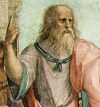- Ring of Gyges
-

Part of a series on Plato Early life · Works · Platonism
Epistemology · Idealism / Realism
Theory of Forms
Form of the Good
Third man argument
Euthyphro dilemma · Five regimes
Philosopher kingAllegories and metaphors Ring of Gyges · The cave
The divided line · The sun
Ship of state · Myth of Er
The chariotRelated articles The Academy in Athens
Socratic problem
Commentaries on Plato
Middle Platonism · Neoplatonism
Neoplatonism and ChristianityThe Ring of Gyges is a mythical magical artifact mentioned by the philosopher Plato in book 2 of his Republic (2.359a–2.360d). It granted its owner the power to become invisible at will. Through the story of the ring, Republic discusses whether a typical person would be moral if he did not have to fear the consequences of his actions.
Contents
The legend
According to the legend, Gyges of Lydia[1] was a shepherd in the service of King Candaules of Lydia. After an earthquake, a cave was revealed in a mountainside where Gyges was feeding his flock. Entering the cave, Gyges discovered that it was in fact a tomb with a bronze horse containing a corpse, larger than that of a man, who wore a golden ring, which Gyges pocketed. He discovered that the ring gave him the power to become invisible by adjusting it. Gyges then arranged to be chosen as one of the messengers who reported to the king as to the status of the flocks. Arriving at the palace, Gyges used his new power of invisibility to seduce the queen, and with her help he murdered the king, and became king of Lydia himself. King Croesus, famous for his wealth, was Gyges' descendant.
The role of the legend in Republic
In Republic, Plato puts the tale of the ring of Gyges in the mouth of Glaucon, who raises the issue as to whether any man can be so virtuous that he could resist the temptation of being able to perform any act without being known or discovered. Glaucon suggests that morality is only a social construction, the source of which is the desire to maintain one's reputation for virtue and honesty. Hence, if that sanction were removed, one's moral character would evaporate.
Glaucon posits:
- Suppose now that there were two such magic rings, and the just put on one of them and the unjust the other; no man can be imagined to be of such an iron nature that he would stand fast in justice. No man would keep his hands off what was not his own when he could safely take what he liked out of the market, or go into houses and lie with any one at his pleasure, or kill or release from prison whom he would, and in all respects be like a god among men.
- Then the actions of the just would be as the actions of the unjust; they would both come at last to the same point. And this we may truly affirm to be a great proof that a man is just, not willingly or because he thinks that justice is any good to him individually, but of necessity, for wherever any one thinks that he can safely be unjust, there he is unjust.
- For all men believe in their hearts that injustice is far more profitable to the individual than justice, and he who argues as I have been supposing, will say that they are right. If you could imagine any one obtaining this power of becoming invisible, and never doing any wrong or touching what was another's, he would be thought by the lookers-on to be a most wretched idiot, although they would praise him to one another's faces, and keep up appearances with one another from a fear that they too might suffer injustice.
-
- — Plato's Republic, 360b-d (Jowett trans.)
Socrates, however, explains that justice does not derive solely from this social construct: the man who abused the power of the Ring of Gyges has become morally bankrupt and suffered irreparable failings of character, while a man that chose willingly not to use it is at least at peace with himself.(Republic 10:612b)
Influence
The story has been cited as one of the sources to J. R. R. Tolkien's One Ring, especially to the behavior of Gollum, as bearer of the Ring and his misdeeds in his original village.[2]
H.G. Wells' The Invisible Man had as its basis a retelling of the tale of The Ring of Gyges.[3]
See also
References
- ^ In Republic book 10, Socrates refers to the ring as belonging to Gyges himself, not his ancestor, as Glaucon states in Book 2. For this reason, the story is simply called "The Ring of Gyges".
- ^ Philosophy Essay: Lord of the Rings
- ^ http://www.depauw.edu/sfs/backissues/57/holt57art.htm
External links
- Glaukon's Challenge Glaukon's speech from book 2, translated by Cathal Woods (2010).
- Plato, Republic Book 2, translated by Benjamin Jowett (1892).
- The Ring of Gyges Analysis by Bernard Suzanne (1996).
Categories:- Platonism
- Greek mythology
- Magic (paranormal)
- Rings
- Fictional objects
- Concepts in ethics
Wikimedia Foundation. 2010.
